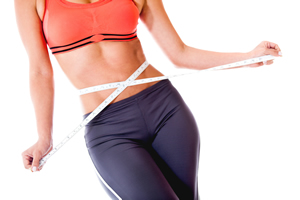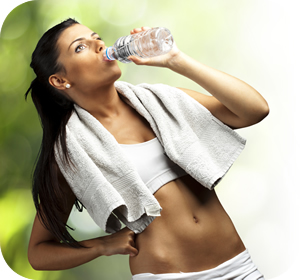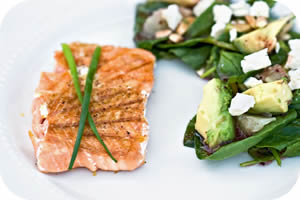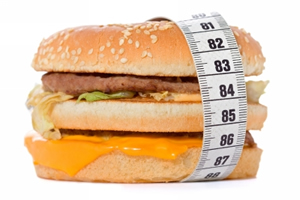Dr. Abelson’s Essential Nutritional Program – Part 6
Fat Loss 101
 Think long-term…. avoid the rebound effect!
Think long-term…. avoid the rebound effect!
Keep your weight-loss goals realistic. It is reasonable to expect to lose about one to three pounds per week. Too rapid weight-loss almost always results in a rebound effect, where all the lost weight returns if you fall off the path. In many weight-loss programs, the quick weight that you lose is often due to loss of muscle, rather than fat loss. When you lose muscle mass, you actually lower your metabolism since muscles are the primary “burners” of carbohydrates and fats in your body.
Dramatic decreases in caloric intake leads to decreased or slower metabolism, and more weight gain.
Suddenly reduced, or too low, caloric intake leads to a loss of muscle mass as your body struggles to meet its daily energy requirements by burning muscle rather than fat. It also causes your body to STORE FAT. This can happen whenever you eat less than 1000 calories a day. Your body requires at least 1500 calories a day just to perform its basic functions. Decreases in your muscle mass results in a decrease in your metabolic rate, which in turn results in more fat being stored! This is the major reason for the failure of over 80% of all diet plans. Instead of training your body to burn fat, they train your body to store fat.
Graze, Don’t Gorge!
Frequent SMALL meals are better for weight loss. Frequent small meals serve to convince your body that you are NOT starving, that food is abundant, and that fats DON’T need to be stored for hard times. Basically, you need to provide you body with good quality food on a regular basis. This will have several positive effects: it will help balance your blood sugar, accelerate healing, and provide you with the energy you need for exercising.
Your Mother was right…. you need to eat breakfast!
Did you know that your body burns about 450 calories when you sleep at night? Your body needs to re-fuel at breakfast time. If you don’t have breakfast, your blood sugar levels can fall too low, resulting in cravings for high-sugar food. Successful individuals in any weight-loss program always eat breakfast.
Fast food is generally made with cheaper ingredients, such as high fat meat, lots of saturated and trans fats, lots of salt, and cholesterol. All of these ingredients lead to health problems, weight gain, high blood pressure, inflammation, and heart disease. Consider what is in a basic, medium-size, fast food meal of a burger, French Fries, and a vanilla shake. In that one meal you will get 87 grams of fat and 1,480 calories. If you want to gain weight, inflame your body, and die of a heart attack, then by all means, go for it and enjoy that meal.
Start thinking about your body-fat percentage not your weight.
Body-fat percentage measures the percentage of fat in your body. If you are 200 pounds and 30% fat, it means that your body consists of 60 pounds of fat and 140 pounds lean body mass. Your goal is to gain muscle (which burns fat). Remember, muscle also weighs more than fat. So initially, don’t worry about what the scales say. Your focus is to get rid of the fat while adding on muscle.
Add Muscle to Your Body
 Muscles burn more calories than any other type of tissue in your body (with the exception of your brain). Muscles help to increase your resting metabolic rate, which means you burn fat even when resting. For each pound of muscle that you add to your body, you will burn an extra 50 calories each day. This means if you add five pounds of muscle mass to your body, you can burn 250 extra calories a day, even when you are just sitting around.
Muscles burn more calories than any other type of tissue in your body (with the exception of your brain). Muscles help to increase your resting metabolic rate, which means you burn fat even when resting. For each pound of muscle that you add to your body, you will burn an extra 50 calories each day. This means if you add five pounds of muscle mass to your body, you can burn 250 extra calories a day, even when you are just sitting around.
Strength training (or muscle building) should be one of the fundamentals of any weight loss program. (Note: diet changes alone will not give you the results you want!) Strength training builds muscle mass and increases your resting metabolic rate. Exercise and strength training are the keys for getting rid of all that already stored, excess fat.
It is important to differentiate between weight-lifting exercise and cardiovascular exercise. There is no doubt, that cardiovascular exercise does burn a lot of calories. The problem is, it is not nearly as efficient at turning up your fat burning furnace as weight lifting can be. In fact when you compare the two exercise formats, cardiovascular exercise is about 40% less efficient at burning fat than weight lifting . I am not saying you should give up your cardio-routine. Cardiovascular exercise is great for your overall health, especially your heart. The problem is that using only cardio as your primary exercise will not help you to achieve the fat loss you what.
I am currently developing an weight-loss exercise routine that is designed to help you increase muscle mass (lose fat). I will be presenting this in a future blog.
Get a good night’s sleep!
You need to sleep at least 8 hours every night if you want to lose weight. Lack of sleep increases stress, stress increases cortisol levels in your body, and increased cortisol levels result in weight gain. Lack of sleep affects the level of hormones which control weight-loss – melatonin and human growth hormone. Both of these are produced during sleep, and interruptions and lack of production inhibits their positive effects on your body. In fact, research has shown that the probability of your being obese is 73% higher if you get only four hours of sleep per night.
Specific Dietary Recommendations
If you want to lose fat, decrease your body fat percentage, and feel the best you have felt for years here is what I suggest.
 Stay hydrated:
Stay hydrated:
Drink two glasses of water before each meal. Then continue to drink water on a regular basis throughout the day. Read my blog about the importance of hydration for more information.
Drinking lemon or lime water is a great way to make your body more alkaline. The amazing thing is that lemons can turn even regular tap water alkaline.
Meals and snacks:
My basic dietary program is quite simple, eat three meals per day and 2 or 3 snacks. Avoid processed or packaged foods, refined carbohydrates, high fat foods, and eat your foods in as natural a state as possible. You should also do everything can to make your food taste great. Use spices and herbs liberally but take it easy on the salt you add to your food.
Each meal should contain protein, complex carbohydrates and essential fatty acids. You should also try to make choices that will make you meals more alkaline in nature.
Remember,eating health foods can be a very enjoyable experience. You can lose all the fat you want, and still enjoy your food.
Breakfast
First off you need to eat breakfast, DO NOT SKIP THIS MEAL! Breakfast should contain a serving of protein, dairy, fruit or grains and any amount of vegetables you would like.
You can have coffee (espresso is more pH balanced – drip coffee is quite acidic), tea (ginger or green tea), or “FRESH” vegetable or fruit juice with your breakfast.
Please note: If you are having grains, then make sure you are not reacting to wheat or gluten. Again a topic for a future blog.
Lunch
At lunch, you should have a serving of protein, fruit, and any amount of vegetable that you would like. Remember to drink two glasses of water (lemon water preferably) before you eat your lunch.
 Dinner
Dinner
Again, as with the other two meals, you need to get a serving of protein, complex carbohydrates and essential fatty acids.
For many individuals this is the main meal of the day. Try not to bulk up on this meal, and be sure to spread your total food intake throughout the day. As with the other meals, take a look at the PRAL chart to balance out the acidity of the meal.
Snacks:
There are numerous healthy foods that you can use as snack throughout the day. Just be sure not to eat too much of these foods, otherwise you may find that you are sabotaging your fat-loss program.
I hope you will consider following the fat loss program I have just laid out for you. This program can literally transform your life. It has taken many of my patients out of pain, returned their energy, and literally revitalized their lives. I hope it can do the same for you.
More Information
See the following blogs for the rest of Dr. Abelson’s Essential Nutritional Program:
- Dr. Abelson’s Essential Nutritional Program Part 1 – Eating the Right Foods
- Dr. Abelson’s Essential Nutritional Program Part 2 – All About Fats – Good and Bad
- Dr. Abelson’s Essential Nutritional Program Part 3 – The Importance of Drinking Water
- Dr. Abelson’s Essential Nutritional Program Part 4 – Alkaline Diets
- Dr. Abelson’s Essential Nutritional Program Part 5- Weight Loss and Conditions Related to Obesity
Do you want more information about this, and other topics. Our books (eBooks and hard-copy) provide more information about soft-tissue injuries, rehabilitative exercises for injury recovery, and how to use these to activate and restore all the structures of your kinetic chain.
To purchase our internationally best-selling books, visit www.releaseyourbody.com.
For information about our clinic in Calgary, Alberta, please go to www.kinetichealth.ca. Or call us at 403-241-3772.
(COPYRIGHT KINETIC HEALTH 2013 – ALL RIGHTS RESERVED)


Leave a Reply